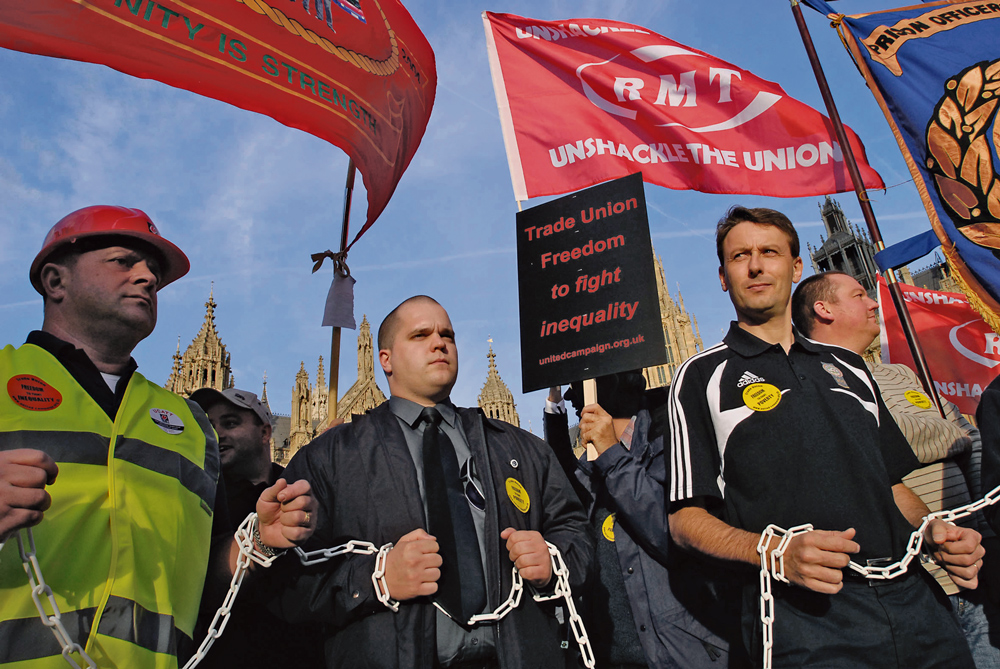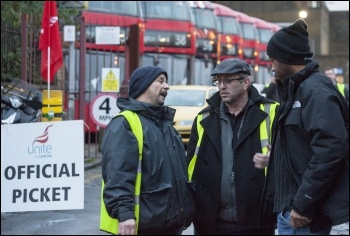Rob Williams, Chair, National Shop Stewards Network (NSSN)
On 12 June, the Independent Police Complaints Commission (IPCC) ruled that there would be no investigation into police actions at Orgreave during the 1984-85 Miners’ strike. In the ultimate self-fulfilling prophesy, after 30 years of conspiracy, lying, cover-up and delay, the IPCC say it’s now too late!
This is a stark reminder of the cruel class outlook of British capitalism that governed their approach during the strike when, in today’s terms, between £6 – £17 billion was spent to defeat the most militant section of the trade union movement and devastate these working-class communities in what are now high-unemployment blackspots.
But they had another motive. To open the door to a counter-revolution by successive neo-liberal governments and employers that has sought to sweep away all the gains made by the working-class in the post-war period.
On one hand public services have been privatised and outsourced, while on the other collective bargaining agreements – where unions are able to negotiate on behalf of their members – are at an all-time low. This is the backdrop to the culture of zero-hour contracts, agencies and umbrella companies.
The victory of the Tories in the general election has, they believe, given them a mandate to roll out their full anti-working-class programme. On 8 July, Osborne intends to announce a further £13 billion welfare cuts on the back of the £80 billion public sector austerity offensive already carried out in the last five years of Con-Dem rule.
It is no accident that the Queen’s Speech on 27 May set out new anti-union laws. Despite the continuous propaganda from the Tory press, the ruling class fully understands the potential power of the unions – with 6.5 million members.
During the Con-Dem years, Cameron increasingly looked to attack democratic union rights, particularly in terms of facilities for union reps and shop stewards. Scandalously, this has been copied by Labour controlled councils, especially where those representatives, some of whom are Socialist Party members, are seen as militant. Cameron also used his first term to bring in £1,200 fees for employment tribunals which has led directly to a 70% fall in employees’ claims.
PCS
The Tories have particularly looked to attack civil service union PCS, in which Socialist Party members have key leadership positions. PCS has been at the forefront in building co-ordinated strike action against the Con-Dem cuts, which peaked in the two million-strong pensions strike of November 2011.
This year the government cancelled the past agreement to deduct union subs from members’ wages – ‘check-off’ – in the two departments where PCS has its biggest membership. This was a deliberate attempt to bankrupt the union, but in an incredible campaign, PCS has re-recruited 80% of its members in Department for Work and Pensions and HMRC (revenue and customs) so far.
The Tory Trade Union Bill includes voting thresholds for future industrial action ballots where at least 50% of members have to vote for the result to be valid. In undefined ‘essential’ services it will be worse – 40% of the total membership, whether they vote or not, have to vote for action for it to be legal. Those who don’t vote are effectively counted as against. What incredible hypocrisy – this is from a government that only 24% of the electorate voted for!
The Tories are making plans for an expected strike wave, including using the emergency Cobra committee. The Sunday Times reports that Matthew Hancock, Cabinet Office minister, has a “team of 73 officials working on contingency plans with employers to ensure there were staff prepared to cross picket lines and keep services operating.” In other words – along with allowing agency workers to cover strikers’ work – organised scabbing.
This isn’t the first time that British capitalism, through its political representatives, has tried to attack the unions. For example, the Tory government of Ted Heath brought in the Industrial Relations Bill after its election in 1970.
The first of Thatcher’s draconian anti-union laws was introduced in 1980. She and the subsequent Tory prime minister, John Major, introduced six Acts of Parliament, which are the foundation for what Tony Blair boasted are the most restrictive labour laws in Western Europe. Disgracefully, he and Gordon Brown, the following Labour prime minister, left them on the statue book.
Both Tory attacks were brought in to restrict the unions at a key time for British capitalism. The post-war boom was petering out by the early 1970s but the attempts by industry to restore its profitability by squeezing the living standards of workers foundered on the rocks of a powerful trade union movement, with a strong shop stewards’ movement at its base.
1970s
In reality, many of Heath’s laws were outlined in the failed ‘In Place of Strife’ legislation of the previous Labour government. That had been defeated by the unions merely flexing their muscles at a time when they had a much greater influence, in a much different Labour Party to now.
The scene was set for one of the most volatile periods in modern history in terms of industrial struggle. One of the high points was when, in 1972, five London dockers were jailed for leading unofficial strike action. This resulted in widespread mass walkouts well beyond the docks, flouting Heath’s legislation. Under pressure, the TUC threatened a general strike, but only when they knew the government were going to release the ‘Pentonville Five’.
In 1974, the miners’ union the NUM, held their second strike in three years and forced Heath to call a snap general election asking: “Who rules – Heath or the miners?” As one miner remembered in the recent film ‘Still the Enemy Within’: “It wasn’t ****ing him!”
The Tories and their class, recognising the particular role of the miners in the defeat of Heath’s government, later looked to avenge it. The ‘Ridley Plan’ named after one of Thatcher’s lieutenants, went into great detail on how the miners could be taken on and defeated. A big part of this would be to place legal restrictions on the ability of unions to take solidarity action, so-called ‘secondary picketing’.
The miners’ strike of 1984/85 was a heroic struggle. It laid bare all the class realities of British society, so well hidden in ‘normal’ times. But its defeat wasn’t inevitable. Neither was the ability of Thatcher to bring in her anti-union laws. One of the first tests was the dispute by printers at the Stockport Messenger newspaper in 1983, when their union had its funds sequestrated by the courts for its members taking solidarity action.
The unwillingness of the TUC and the rest of the unions to take mass action, such as a 24-hour general strike, emboldened the Tories who turned their attention to the NUM, confident that they would be left largely isolated. The same tactics were used against the printers sacked by Murdoch at Wapping in 1986.
The confrontations of the early 1970s and the mid-1980s are rich in lessons for trade unionists today as we face up to the Tories’ new anti-union laws. The lesson from both periods is that these attacks must be met with massive resistance by the unions on the scale of a 24-hour general strike. They cannot be merely negotiated away by slick union officials.
The halting of the pensions dispute after the November strike showed that many of the union leaders have not understood that the era of austerity is a totally different period from the recent past. Indeed two of the union leaders who sold out the strike have now been knighted!
There was the potential to extend that action and escalate it to push Cameron back and even inflict a terminal defeat on the Tory-led Coalition. But instead it was the Con-Dems who grew in confidence to roll out the most brutal austerity offensive for 90 years. And now the Tories, ruling alone, want to go much further.
Now
Over the last two years, there have been some notable disputes where the power of the working-class has been displayed, often resulting in major concessions being won or in outright victories.
In London, first tube workers and then bus drivers have brought the capital to a shuddering halt. Then earlier this year, Network Rail workers forced the government to break its 1% pay ceiling at the prospect of a national strike.
Now 17,000 steelworkers have forced Tata to the negotiating table before a first national steel strike for 35 years. They are an uncomfortable reminder to the ruling class of the decisive power, often latent, that the working-class possesses. But they are also proof of the need for them to act to muffle that power. These workers would certainly come under the category of ‘essential services’!
The National Shop Stewards Network (NSSN) conference on 4 July is a key forum for rank and file union activists to discuss how Cameron’s laws and cuts can be resisted. The NSSN steering committee will move a statement that calls on the TUC and the unions to organise a national midweek demonstration on the day that the Tories bring the Trade Union Bill to Parliament, possibly this autumn.
Such a protest would need to be linked to the tranche of cuts set out on Osborne’s 8 July budget. It would attract all those facing these vicious cuts. Unions could co-ordinate existing disputes to allow a number of strikes to take place together. As we go to press, four unions on the London Underground are planning action on 8 July for example.
An injury to all
If any union is attacked for defying the anti-union laws, or is fined for refusing to call off a strike if it hadn’t met the new voting thresholds, the response must be ‘an injury to one is an injury to all’. The main demand should be for a 24-hour general strike.
But the unions would need to prepare the ground for such mass joint action. Rallies and public meetings on the theme of ‘stop the Tory union-busters! Fight the cuts together!’ should be organised by the unions in every town and city, spelling out why workers need to strike together and why union rights are essential to defeat yet more cuts.
Inevitably, such a campaign would raise the need for real political representation for workers, their families and communities, especially with Labour councils preparing to pass on yet more Tory cuts. That is why the Socialist Party takes part in the Trades Unionist and Socialist Coalition, and campaigns for a new mass working class party.
The next few months and years will be a huge test for the unions. We must develop a strategy to defeat the attacks on the working class and its movement. The NSSN can play a key role in that.
National Shop Stewards Network
9TH ANNUAL CONFERENCE: Stop the Tory union busters!
Saturday 4 July 11am to 4.30pm
Conway Hall, Holborn, London WC1R 4RL
Speakers include
- Special guest: Greek trade union activist Harris Sideris, a member of the trade union rank and file committee of the contract workers, sacked by Vodafone.
- PCS general secretary Mark Serwotka
- BFAWU general secretary Ronnie Draper
- FBU general secretary Matt Wrack
- RMT president Peter Pinkney
- POA general secretary Steve Gillan
- Youth Fight for Jobs organiser Helen Pattison
- Anti-blacklisting campaigner Dave Smith
- Tamil Solidarity trade union coordinator Isai Priya
- NSSN chair Rob Williams












